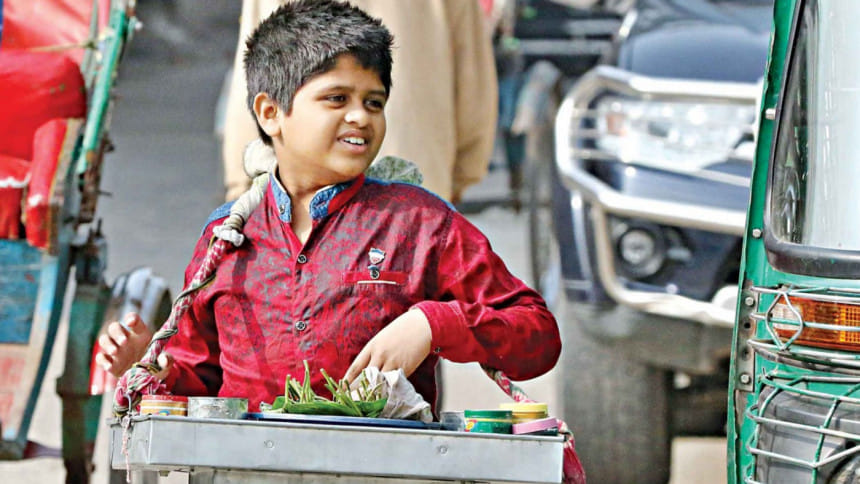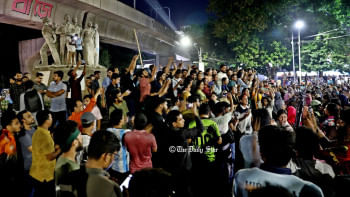Four steps to reopening schools and recovering learning losses

The second wave of the pandemic has hit life and livelihood hard and has thrown us all into deep anxiety. For 40 million students, life-and-livelihood is to be in school. Normal life has been taken away from children and youth for over 14 months. How can their lives be returned to them? Four policy and action steps can help. The budget for the new year, starting in July, needs to make necessary provisions to support these steps.
In a webinar organised by Campaign for Popular Education (CAMPE) on April 29, budget priorities for the pandemic-devastated education system were discussed in the presence of Planning Minister M Abdul Mannan and Education Secretary Md Mahbub Hossain. Speakers pointed to four kinds of measures that the budget should support and which would make it possible to restart school and begin the recovery of deep and unforeseen learning losses.
First, the authorities need to move away from the thought of reopening all schools all over the country on a fixed date. In Kutubdia and Khagrachhari upazilas, for example, total Covid-19 infection has been less than one person per 10,000. Is there any logic in keeping all schools shuttered and students confined to their homes in these areas? Schools can be opened in phases, taking into account the local infection rate. Health precautions and safety rules, however, have to be observed strictly. Upazila education and health authorities need to have a coordinated plan involving upazila health complexes and union health clinics for rapid antigen testing (to keep infection rate under surveillance), contact tracing, and treatment for symptoms as needed (It is difficult to understand why rapid antigen tests are not used widely). Health protection for students and teachers may be seen as ambitious, but a beginning in this direction has to be made. For all we know, we have to learn to live permanently with Covid-19 or similar epidemic threats.
Second, restarting school is not enough. A teaching-learning plan to compensate for the long cessation of learning has to be implemented. This plan has to be one that is based on the science of learning rather than what is administratively easy and convenient. The thinking so far is to count the number of lessons that can be delivered during the year after schools open, cut parts of the syllabus in all of the subjects (six in primary and 13 in secondary) to fit the number of lesson days, and test students at year-end on these lessons for promotion to the next class. The expectation is that school and students can go back to their normal routine next year.
Unfortunately, this administratively neat solution will not work for most students. The loss of over a year cannot be covered in the remaining days of the year (how many such days remain will depend on when schools can open). The science of education curricula and children's learning indicate that there are core competencies (such as in first language and math at the primary level) and in Bangla, math, science and English at the secondary stage that students must learn. There cannot be much scope for short cuts in these areas. Instead of trying to teach something in all the subjects in the syllabus, it is time now to concentrate on the core skills and knowledge subjects. Mastery in these skills will make students self-reliant and enable them to cope with other subjects eventually.
However, even devoting all efforts on Bangla and math at primary and the four areas at the secondary stage will not be sufficient to recover the loss of over a year (plus what students may have forgotten of their past learning) in the dwindling number of days in the school year. A prudent move would be to extend the current school year by at least six months up to June 2022. In other words, no year-end exam until June next year and promotion to the next class, after a summer vacation, in September next year. This "class-promotion holiday" will allow necessary time to plan for concentrated efforts in core subjects and enable students to acquire the core skills appropriate for their grade.
Teachers and teacher's assistants, who may be recruited to help in the extra learning needed for students, will need subject- and grade-wise guidelines. They will need help in assessing students' levels, as well as tips on the best ways of helping students, linking digital materials to classroom lessons, communicating with parents, and offering social-emotional support to students. Online teachers' portals should be built and teachers encouraged to participate. Teachers also need to be provided with financial incentives linked to results for the extra work and effort demanded of them. Methods should be devised to include non-government and non-MPO schools in these initiatives, since a large proportion of students are enrolled in these institutions.
By making a virtue of necessity, the school calendar can be changed in 2022, shunning the colonial era legacy of January-December to a climatically more appropriate—and in line with practice in many countries—schedule of mid-September to end-June, followed by a predictable and long break in the sultry and rainy times of the year. This would mean there would be no cyclical Ramadan holidays for school. Like all other businesses and offices, schools can remain open, but the daily school hours may be modified. Educationists have spoken about the time taken away from regular learning from November to February for annual year-end exams and starting the new year. This is the temperate and relatively rain-and-storm free time of the year that should be used for regular learning activities in school.
The education authorities are in a dilemma about when SSC and HSC exams may be taken this year, after abandoning the HSC examinations last year. Should they hold the exams with all the subjects in the syllabus, which lasts for six weeks or longer? The principle of the core competencies can be applied in this regard also. The SSC exams can be held on four papers for Bangla, English, math and science and can be completed in four days. At the HSC level, more papers on the separate streams have to be added, but the exams can still be completed within a week or so. A decision can be announced along this line for the school years '21 and '22 to relieve examinees of uncertainty and anxiety, and necessary preparations can begin for this purpose. The exact dates of the exams will depend on the pandemic situation, so that a certain number of in-person classes can be held before the exams. PECE and JSC exams may also be reconsidered along this line. Many educationists argue that abandoning them would do no harm and would actually be helpful.
Thirdly, proper implementation of school reopening and learning recovery will require a collaborative effort involving education NGOs, community organisations, local government and forums such as CAMPE, Health Watch and the Bangladesh ECD Network. The national directives have to be adapted and adjusted to each upazila and each institution, and appropriate work plans have to be prepared assessing local circumstances. Parents and teachers have to understand and support what has to be done. Resource requirements and sources of support have to be worked out. The implementation process has to be monitored and adjustments made as needed. Work teams that include officials and NGOs have to guide and carry out these tasks. An important activity would be to recruit, orient and supervise—in cooperation with education NGOs—teaching assistants to provide extra instructional support to students lagging behind. This cannot be left only to currently employed teachers in schools whose numbers are not sufficient and who are already overburdened.
Fourth, the school meal initiative, planned to be gradually expanded, should be accelerated to cover all pre-primary and primary level students, and at least selectively at the secondary level in ecologically and economically disadvantaged areas. All students at the elementary stage (up to grade eight) are offered a hot meal every school day all over India. During school closure due to the pandemic, rice, lentil and oil rations have been supplied monthly to every students' family in West Bengal. It is claimed that we have reached the per capita income level of India. If they can do it, we can as well.
The plan, implementation strategy and budget proposal for the steps suggested must come from the two ministries of education before the Ministry of Finance can consider these, with the Prime Minister's overall guidance, for inclusion in the national budget proposal. The ball is in the court of the two ministries of education.
Dr Manzoor Ahmed is professor emeritus at Brac University.

 For all latest news, follow The Daily Star's Google News channel.
For all latest news, follow The Daily Star's Google News channel. 



Comments